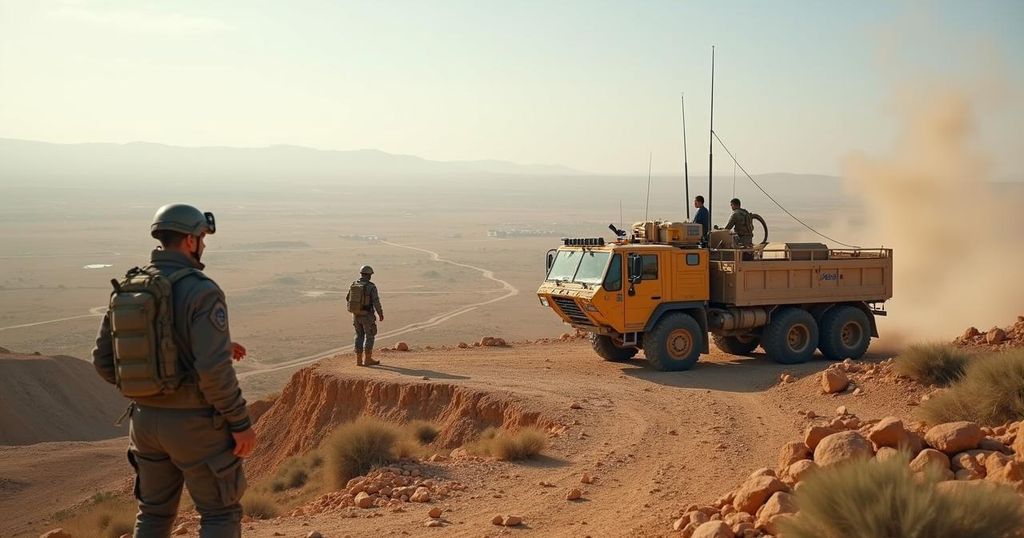Iran’s Quds Force General Killed in Israel Strike: Body Recovered and Inquiries Ongoing
Iran has recovered the body of Brigadier General Abbas Nilforoushan, killed in an Israeli airstrike in Beirut alongside Hezbollah leader Hassan Nasrallah. The IRGC confirmed Nilforoushan’s recovery and investigations are underway related to security breaches during their meeting. Esmail Qaani’s absence raises questions, but he is reported to be in good health and anticipated to receive an award soon. The situation indicates escalating tensions in the region with ongoing investigations into military vulnerabilities.
Iran has announced the recovery of the body of Brigadier General Abbas Nilforoushan, a senior commander of the Quds Force, who was killed in an Israeli airstrike in Beirut last month. He was reportedly in Lebanon to meet with Hezbollah leader Hassan Nasrallah on September 27, when the strike targeted a Hezbollah operations center in the southern suburbs of Beirut. In a statement made public on Friday, the Islamic Revolutionary Guard Corps (IRGC) confirmed: “With hard work and efforts around the clock, the body of martyr Abbas Nilforoushan has been discovered.” They indicated that details regarding the transportation of his body back to Iran and subsequent funeral arrangements would be communicated at a later date. This announcement follows ongoing speculation surrounding the whereabouts of Esmail Qaani, the head of the Quds Force, who has not made a public appearance since before the deaths of Nilforoushan and Nasrallah. Reports suggest that Qaani may have been present during a subsequent airstrike on October 4, which is believed to have resulted in the death of Hashem Safieddine, who is viewed as Nasrallah’s likely successor. Doubts about Qaani’s safety have circulated, but sources within the Iranian military state that he is “in perfect health” and is expected to receive an award from Iranian Supreme Leader Ali Khamenei shortly. Meanwhile, there is an ongoing inquiry into security breaches that are suspected to have facilitated Israel’s attack on Nasrallah. The investigations focus on possible negligence or mismanagement within Qaani’s ranks which may have led to the unprotected meeting between him and Nilforoushan. The Iranian regime remains vigilant following its ballistic missile attacks against Israel on October 1, which were launched in response to the death of Nasrallah and Israel’s military escalation in the region, particularly concerning Lebanon and Gaza. Israel is also preparing for retaliatory measures, with Defense Minister Yoav Gallant emphasizing that future strikes will be “lethal, precise and above all, surprising.” General Nilforoushan had been overseeing military operations in Syria and Lebanon since taking over from General Mohammad Reza Zahedi, who died in an Israeli airstrike in Damascus earlier this year. Esmail Qaani, now 67 years old, was appointed to lead the Quds Force following the death of the previous head, Qassem Soleimani, in a U.S. drone strike in January 2020.
The context of this incident stems from ongoing tensions in the Middle East, particularly involving Iran, Hezbollah, and Israel. The Quds Force is an elite unit within Iran’s Islamic Revolutionary Guard Corps that engages in foreign operations, especially in supporting allied groups like Hezbollah in Lebanon. The killing of prominent military figures such as Qassem Soleimani and now Abbas Nilforoushan represents a significant escalation in hostilities, prompting Iran to retaliate and heighten its military posture. Furthermore, the precarious security situation in Lebanon and the broader implications of these military actions on regional stability cannot be overstated.
In summary, the recovery of Brigadier General Abbas Nilforoushan’s body represents a significant development in the Iranian military’s response to ongoing Israeli aggression. The situation surrounding Esmail Qaani and the inquiries into security lapses highlight the vulnerabilities within Iran’s military leadership. As Iran grapples with the aftermath of high-profile losses, tensions between Iran and Israel continue to escalate, with both sides preparing for potential further conflict.
Original Source: www.middleeasteye.net




Post Comment